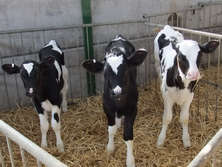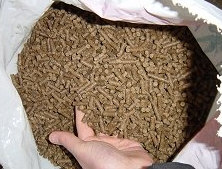Feeding the Calf (0 - 12 weeks)
Calf
growth and development during the first 12 weeks of life lays down the foundation for the future dairy
herd. Calves that have been reared well and
have not suffered from repeated disease checks, scours and pneumonia are far less likely to be culled
prematurely and have a far better chance of achieving high lifetime milk yields, thereby greatly reducing
average replacement costs per litre.
This has been confirmed by various studies which have demonstrated that calves that get off to a better start with higher growth rates have been associated with higher milk yields and improved fertility in their first 1 or 2 lactations. Keeping calves healthy and growing rapidly is essential to maximise lifetime yields.
It costs less to grow calves well and calve them earlier at around 24 months
Calves that develop an effective immune system grow better and go on to produce more milk over their life. Recent research has shown that calves receiving 4 litres of good quality colostrum immediately after birth produced 2600 litres more milk over their first 2 lactations compared with calves receiving 2 litres of colostrum. There is a rapid fall off in antibody uptake even over the first 6 hours after birth. Good quality colostrum can be stored and frozen in thin slabs for rapid thawing (50oC max) and fed via an oesophageal tube.
Cows Milk or Milk Powder?
Calves need plenty of high quality protein and energy to ensure rapid growth. But should cows milk or milk powder be fed? There are serious concerns over using pooled waste milk to replacement heifer calves. As well as the obvious risks of feeding milk contaminated with pathogenic bacteria and antibiotics from cows with mastitis, and the risk of building up antibiotic resistance, there is also the risk of transmitting infectious diseases in un-pasturised milk including Johne's disease and Bovine tuberculosis. Antibiotic milk should not be fed to calves under the DEFRA Welfare Code for Livestock and also due to the serious risk of antibiotic resistance. Johne's disease is present on over 50% of UK farms and an effective control scheme to limit further spread of the disease is needed. Always use milk replacer for rearing heifers and only use waste milk for bull calves (non-breeding). There is no economic justification for feeding cows milk to calves.
It is recommended that whole milk is not fed to calves
 Richard
Webster recommends feeding a high quality milk replacer rather than fresh whole milk for dairy heifers
that will be brought into the milking herd. Calf milk replacers range from 17 - 25ppl so are generally
cheaper than whole milk. In addition a good quality calf milk replacer have a number of advantages over
whole milk including acidification, much higher levels of vitamins and minerals and ease of use. Trials
at Myerscough College showed that dairy heifer calves fed calf milk replacer were 15.4kg heavier at weaning
than those fed on saleable whole milk.
Richard
Webster recommends feeding a high quality milk replacer rather than fresh whole milk for dairy heifers
that will be brought into the milking herd. Calf milk replacers range from 17 - 25ppl so are generally
cheaper than whole milk. In addition a good quality calf milk replacer have a number of advantages over
whole milk including acidification, much higher levels of vitamins and minerals and ease of use. Trials
at Myerscough College showed that dairy heifer calves fed calf milk replacer were 15.4kg heavier at weaning
than those fed on saleable whole milk.
A quality milk replacer will generally grow calves faster and healthier producing a better animal to come into the herd. If waste cows milk is used for calves, ensure that vitamin and mineral supplementation is adequate.
 In order to achieve
live weight gains of 0.8kg - 0.9kg / day up to 600gms - 800gms of a high quality milk powder will need
to be fed. Weaning should ideally not be before 8 weeks of age and only when calves are eating at least
1kg of dry concentrate feed. A high quality calf concentrate, straw and clean water should be available
at all times. Addition of a live yeast supplement from birth throughout rearing is highly beneficial
in order to maximize growth rates. Attention to management, feeding, environment, dry beds, and
good ventilation are essential.
In order to achieve
live weight gains of 0.8kg - 0.9kg / day up to 600gms - 800gms of a high quality milk powder will need
to be fed. Weaning should ideally not be before 8 weeks of age and only when calves are eating at least
1kg of dry concentrate feed. A high quality calf concentrate, straw and clean water should be available
at all times. Addition of a live yeast supplement from birth throughout rearing is highly beneficial
in order to maximize growth rates. Attention to management, feeding, environment, dry beds, and
good ventilation are essential.
RWN Dry Calf Feeds
RWN supplies a full range of quality coarse calf mixes, calf pellets, rearing nuts and rearing blends available both in bags and in bulk designed to suit a wide range of rearing systems. The emphasis being to increase frame size rather than to lay down body fat. We also offer a variety of specialist calf feeding supplements such as live yeast.
RWN Calf Milk Replacers
The choice of calf milk replacer can have a major influence no only on the calves but also on the future health and performance of the dairy herd. Consequently RWN offers a full range of high quality specialist calf milk replacers selected for there ability to produce healthy well grown replacement heifers with the capability to produce high lifetime milk yields in the milking herd.
For dairy farmers committed to high yielding, healthy heifers getting calves off to a good start is a must
For more information or for an in depth consultation contact Richard Webster.
